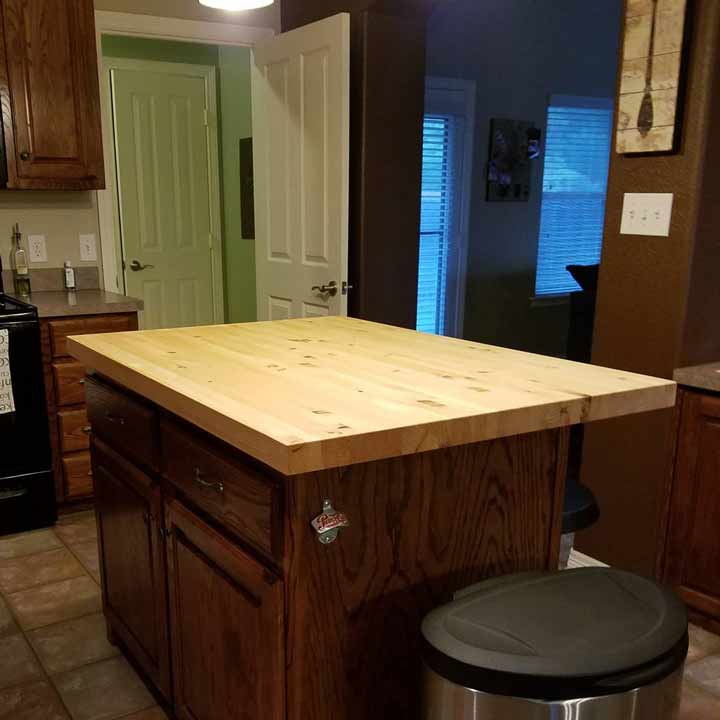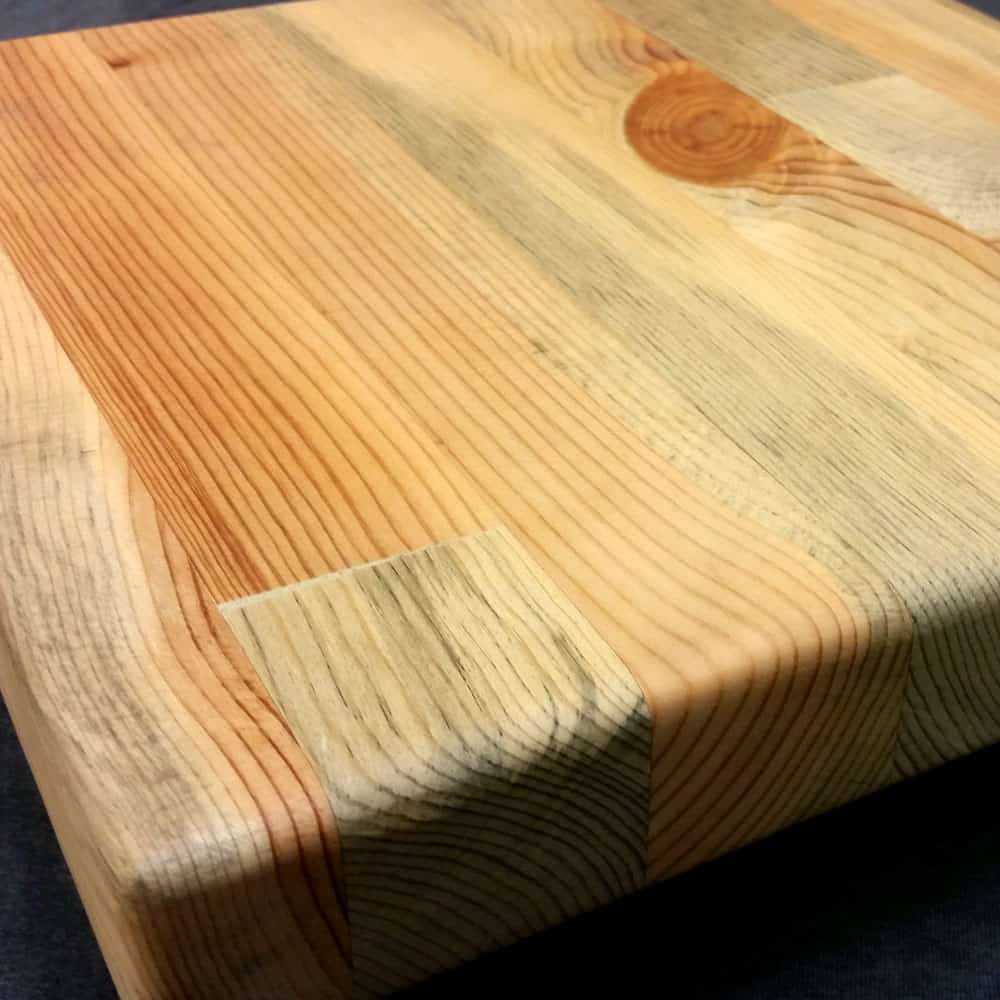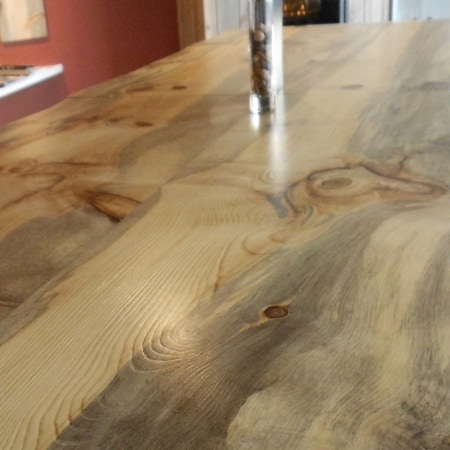Pine butcher block countertops have gained popularity as a warm, natural, and cost-effective option for kitchens and even bathrooms. The charm of wood brings an inviting, timeless aesthetic to any space, and pine, in particular, stands out for its affordability and versatility.
Butcher block countertops, made from individual strips of wood glued together to form a solid surface, provide a functional and stylish solution for homeowners who appreciate the blend of utility and beauty in their home design. Pine, a softwood, offers a unique character with its light tone and distinctive grain patterns, making it a popular choice for those looking to achieve a rustic or farmhouse-inspired look.
One of the primary reasons I find pine butcher block countertops appealing is their warmth and natural beauty. The soft, golden tones of pine add a sense of coziness to the room, creating a welcoming environment. Pine’s distinctive knots and grain patterns give it a one-of-a-kind appearance, adding personality and charm to the countertop. Unlike synthetic materials, wood evolves, developing a patina that enhances its character and tells a story of years of use and care.
Affordability is another significant advantage of pine butcher block countertops. Pine is generally less expensive than hardwoods like oak, walnut, or maple, making it an excellent choice for homeowners on a budget. Despite being a softwood, pine offers a surprisingly durable surface when properly maintained. Its cost-effectiveness does not mean compromising on quality, as pine butcher block countertops can last for decades with appropriate care and upkeep.

When it comes to functionality, butcher block countertops provide an excellent workspace. The smooth wooden surface is ideal for food preparation, and with proper sealing, it becomes resistant to moisture and stains. While I wouldn’t recommend using it as a cutting surface without a protective board, the countertop’s durability ensures it can withstand daily wear and tear. Pine butcher block countertops are also relatively easy to repair, as scratches, dents, or stains can often be sanded out and refinished, restoring the surface to its original beauty.
The versatility of pine butcher block countertops is another reason why they are such a popular choice. Whether you’re aiming for a rustic farmhouse kitchen, a Scandinavian-inspired minimalist design, or even a modern industrial look, pine can adapt to complement various styles.
It pairs beautifully with white cabinetry, contrasts well with darker tones, and harmonizes with a wide range of materials like stainless steel, tile, and stone. The ability to stain or paint pine further enhances its adaptability, allowing you to achieve the exact shade or finish you desire.

Sustainability is an often-overlooked advantage of pine butcher block countertops. Pine trees grow relatively quickly compared to hardwoods, making them a more sustainable choice. Many manufacturers source their pine from responsibly managed forests, reducing the environmental impact of your countertop. Additionally, the biodegradable nature of wood means that, at the end of its life, a pine countertop has a lower environmental footprint than synthetic materials.
The process of maintaining pine butcher block countertops is straightforward, although it does require some effort. To keep the surface looking its best, regular oiling or sealing is essential. Food-grade mineral oil is a popular choice for conditioning the wood, preventing it from drying out and protecting it from water damage. A properly sealed countertop will resist stains and moisture, making it easier to clean and more durable in the long run.
One thing I appreciate about pine butcher block countertops is how forgiving they are. If the surface gets scratched or nicked, it’s relatively simple to fix. A light sanding followed by a reapplication of oil or sealant can restore the wood’s original appearance. This reparability ensures that your countertop remains beautiful and functional for years, even in a busy household where wear and tear are inevitable.

Despite their many benefits, pine butcher block countertops have some limitations. Being a softwood, pine is more susceptible to dents and scratches than hardwood alternatives. However, this can be part of the wood’s charm, as the marks and imperfections contribute to its rustic appeal. For those who prefer a more pristine look, taking extra precautions, such as using cutting boards and avoiding heavy impacts, can help maintain the surface’s integrity.
Another consideration is moisture resistance. While properly sealed pine butcher block countertops can handle spills and humidity, prolonged exposure to water can cause the wood to warp or stain. Wiping up spills promptly and avoiding excessive water exposure is crucial for keeping the countertop in good condition. Regular resealing also helps maintain its water resistance and extends its lifespan.
Installation is a process that requires precision, but pine butcher block countertops are generally easier to install than some heavier materials like stone or concrete. The lightweight nature of pine makes it manageable for DIY enthusiasts, though professional installation ensures a perfect fit and a polished finish. The edges of the countertop can be shaped to suit your aesthetic preferences, from square and modern to rounded and traditional.

Pine butcher block countertops also provide excellent insulation. The natural thermal properties of wood mean that the surface stays relatively warm to the touch, which is a subtle but appreciated feature, especially in colder climates. This quality makes pine countertops particularly suitable for family homes, where a cozy and comfortable environment is a priority.
In terms of resale value, installing pine butcher block countertops can enhance your home’s appeal to potential buyers. While they may not carry the same prestige as granite or quartz, the timeless charm and practicality of wood countertops are widely appreciated. A well-maintained butcher block surface can become a focal point in the kitchen, adding character and boosting the overall aesthetic value of the space.
Overall, pine butcher block countertops offer a delightful combination of beauty, functionality, and affordability. Their natural warmth, adaptability, and easy maintenance make them a practical choice for a wide range of homes and lifestyles. By understanding their strengths and limitations, you can make the most of this timeless material and create a kitchen or bathroom space that feels personal and inviting.

Common Mistakes to Avoid
When working with pine butcher block countertops, one common mistake is failing to seal the surface properly. Without adequate sealing, the wood becomes vulnerable to stains, water damage, and warping. Regularly applying a food-safe sealant or oil is essential to maintain the countertop’s integrity.
Another error is using harsh cleaning agents or abrasive scrubbers, which can damage the wood’s surface. Stick to gentle cleaners and soft cloths to preserve its finish.
Additionally, neglecting to use cutting boards or trivets can result in scratches and burns, as pine is more susceptible to damage than hardwoods. Lastly, skipping periodic resealing can leave the countertop unprotected, so set a maintenance schedule to keep it in top condition.

How do I clean and maintain pine butcher block countertops?
Maintaining pine butcher block countertops is relatively simple but requires consistency. I recommend cleaning the surface daily with a damp cloth and mild soap to remove dirt and debris. Avoid using harsh chemical cleaners or abrasive pads, as they can damage the wood. Every few months, reapply a food-safe mineral oil or wood sealant to protect the surface from moisture and stains. If you notice any scratches or nicks, a light sanding followed by resealing can restore the surface to its original condition. With regular care, your countertop will remain beautiful and functional for years.
Are pine butcher block countertops durable?
While pine is a softwood and not as hard as materials like oak or maple, it is still durable enough for most kitchen or bathroom applications when properly maintained. The surface is susceptible to scratches and dents, but these can often be repaired with sanding and resealing. By taking precautions such as using cutting boards and avoiding heavy impacts, you can prolong the life of the countertop. Pine butcher block countertops are ideal for homeowners who appreciate a surface that ages gracefully, developing character over time.
How do I protect pine butcher block countertops from water damage?
Protecting pine countertops from water damage starts with sealing the surface. Apply a food-safe wood sealant or mineral oil regularly to create a barrier against moisture. Wipe up spills immediately to prevent water from soaking into the wood. Avoid placing wet objects directly on the surface for extended periods. If your countertop is installed near a sink, consider using a silicone mat or tray to catch water and prevent pooling. Regular maintenance and prompt cleaning are key to preventing water damage and keeping the wood in excellent condition.

Can I customize the look of my pine butcher block countertop?
Absolutely! One of the best things about pine is its adaptability. You can leave it natural for a rustic look, stain it to achieve a richer color, or paint it to match your decor. Pine takes stains and paints well, allowing you to create a wide range of finishes. Additionally, the edges and shape of the countertop can be customized to suit your design preferences. Whether you prefer a modern, sleek look or a traditional, ornate style, pine butcher block countertops offer plenty of options for personalization.
Are pine butcher block countertops eco-friendly?
Yes, pine butcher block countertops are considered eco-friendly compared to synthetic materials or slow-growing hardwoods. Pine trees grow quickly, making them a sustainable resource. Many manufacturers source pine from responsibly managed forests, ensuring that the wood is harvested in an environmentally conscious way. Additionally, wood is biodegradable, which means your countertop will have a lower environmental impact at the end of its life. Choosing pine countertops is a great way to incorporate sustainable design into your home.
How do I repair scratches or dents in a pine butcher block countertop?
Repairing scratches or dents in a pine butcher block countertop is straightforward. For shallow scratches, you can sand the affected area with fine-grit sandpaper until the surface is smooth. After sanding, clean the area thoroughly and reapply a food-safe wood sealant or oil to restore the finish. For deeper dents, you may need to use a damp cloth and an iron to steam the wood fibers back into place before sanding and resealing. Regular maintenance and repair will keep your countertop looking its best over time.

New England Wood Countertops – 15 years of custom, waterproof tops

Pine Butcher Block Countertop
Pine is a popular type of wood for butcher block countertops. It is a soft wood, so it is easy to work with and cuts cleanly. Pine is also a relatively inexpensive wood, making it a good choice for budget-conscious homeowners.
Pine butcher block countertops have a warm, natural look that enhances the appearance of any kitchen. They are easy to maintain and can last for many years with proper care.
Pine is a soft wood, so it is important to take care when cutting or chopping on a pine butcher block countertop. Always use a cutting board or chopping block to protect the countertop from damage.
Pine butcher block countertops should be sealed with a food-safe sealer before use. This will help protect the wood from staining and damage. Sealing also makes cleanup easier.
Pine butcher block countertops can be cleaned with a damp cloth and mild soap. Avoid using harsh cleaners or scrubbing pads, as these can damage the wood.
With proper care, pine butcher block countertops can last for many years. They are an attractive and practical choice for any kitchen.
Can pine be used for butcher block countertops?
Pine is a popular wood for butcher block countertops because it is a soft wood that is easy to work with. Pine is also a popular choice because it is a relatively inexpensive wood. However, pine is not the best choice for a butcher block countertop because it is not as durable as harder woods such as maple or oak. Pine is also more susceptible to staining and scratching than harder wood.
How do you finish a pine countertop?
Pine is a softwood that is commonly used in the construction of homes and furniture. It is a popular material for countertops because it is relatively inexpensive and easy to work with. However, pine is also a very porous wood, which means it can be difficult to get a smooth, even finish on a pine countertop.
There are a few things you can do to ensure a smooth finish on your pine countertop. First, make sure the countertop is sanded evenly before you start applying any finishes. You can use a hand sander or a power sander, but be sure to go over the entire surface several times to ensure a smooth finish.
Once the countertop is sanded, you can apply a sealer. This will help protect the wood and prevent staining. You can find sealers at most hardware stores. Apply the sealer evenly with a brush and let it dry completely before continuing.
After the sealer is dry, you can apply a stain or paint to the countertop. Again, be sure to apply the stain or paint evenly and let it dry completely before moving on. Once the stain or paint is dry, you can apply a topcoat. This will help protect the finish and give the countertop a nice shine.
There are a few things to keep in mind when finishing a pine countertop. First, be sure to sand evenly and apply all finishes evenly. Second, be sure to let each layer dry completely before moving on to the next. And third, be sure to apply a topcoat to protect the finish and give the countertop a nice shine.
Related articles:
- Butcher Block Countertop For Kitchen Island
- Can You Paint Butcher Block Countertops
- Butcher Block Countertops With White Cabinets
- Pine Butcher Block Countertops
- Butcher Block Countertops Walnut
- Maple Butcher Block Countertops
- Care Of Butcher Block Countertop
- Butcher Block Countertops Maintenance
- Antique Butcher Block Countertops
- Butcher Block Countertop Sealing